
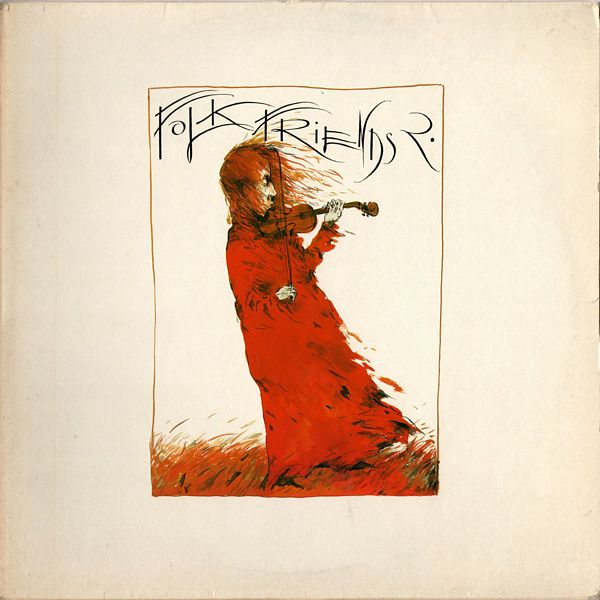 |
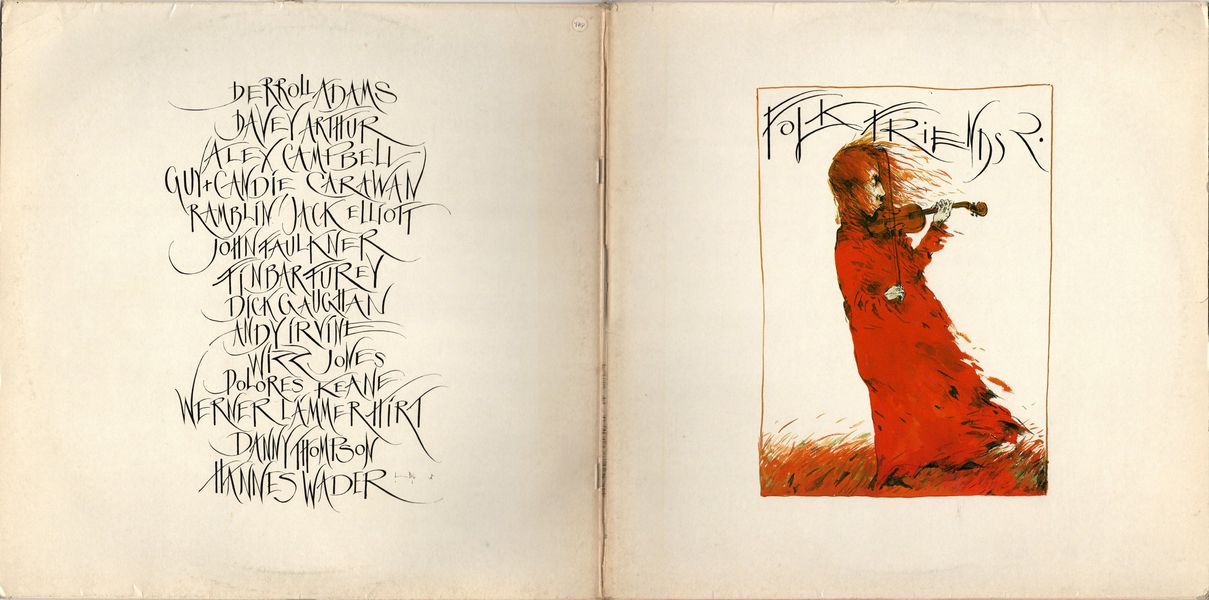
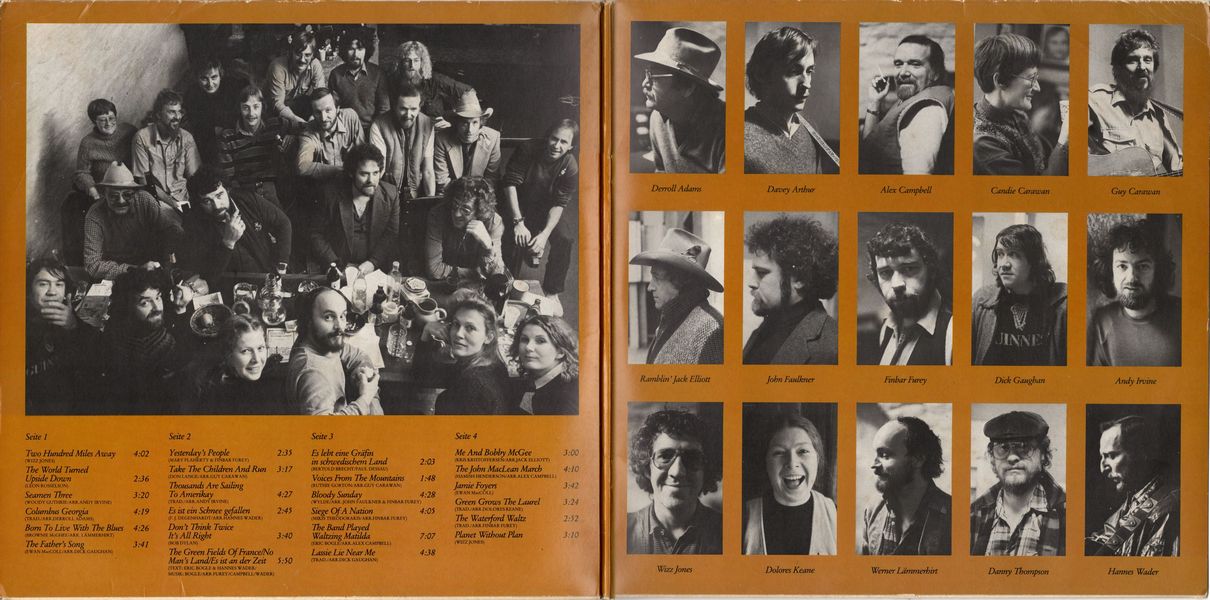
|
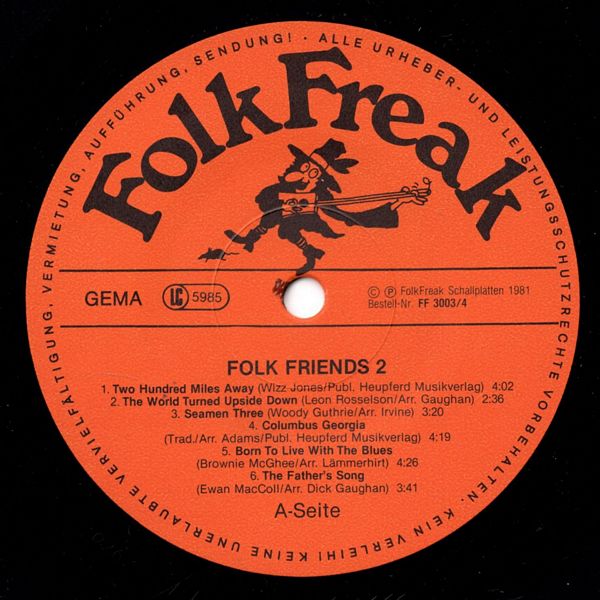
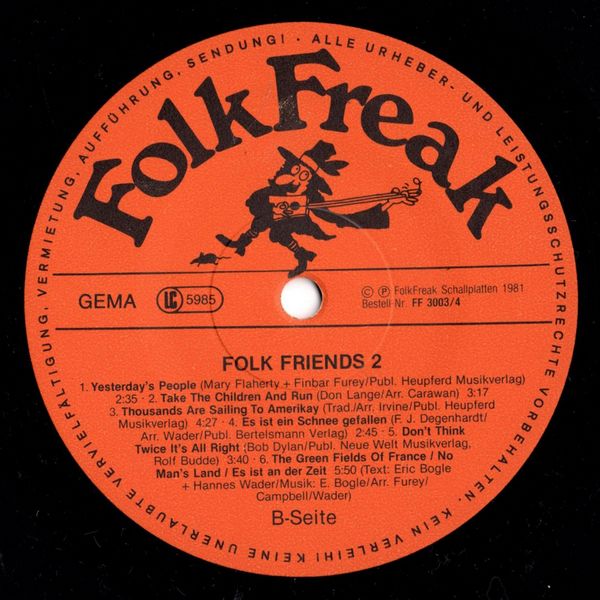
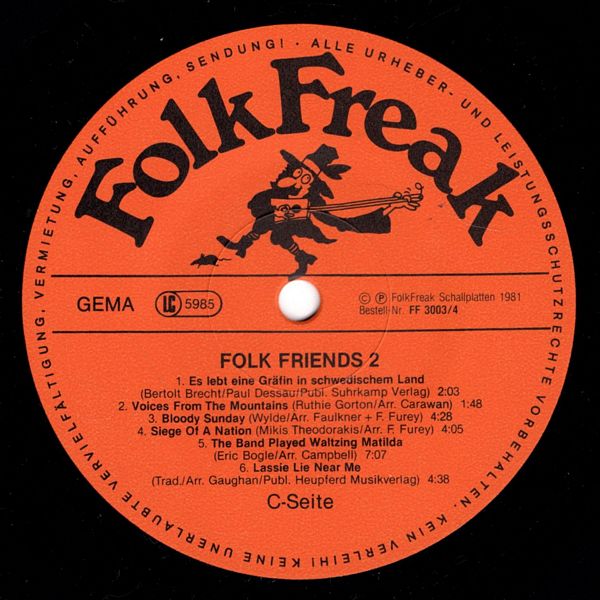
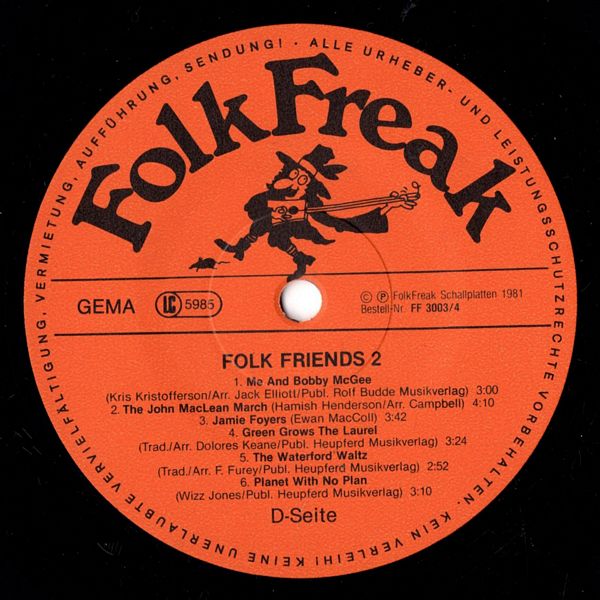
|
| more images |
Sleeve Notes
"FOLK FRIENDS" is not the name of a folk group. "FOLK FRIENDS" is not a fixed formation of folk musicians and singers, but a friendly connection of folk singers from different countries.
The FOLK FRIENDS come from Germany, the USA, Ireland, Scotland and England. They have known each other for many years. Some of their friendships have existed for 25 years or more. Despite different cultures and languages in which they grew up, there are many similarities that bind them together.
They are all professional musicians and/or singers, i.e. they live from the income they earn through performances, their own concerts, records, books, radio and television broadcasts and their own compositions, texts and arrangements. They sing their own songs or folk songs and are paid for it. They play the folk music of their home countries and receive fees from the promoters who engage them.
That was not always so. Each of them started out as an amateur or layman. Everyone started out making music because they liked it. 15, 20 or 30 years ago they couldn't make a living from their songs or folk music. There were hardly any opportunities to perform and only very few professional folk singers in each country.
Each of the FOLK FRIENDS was once a street singer, singing on a street corner, in front of cinemas or in squares for passers-by who threw a few coins into their hats or guitar cases. GUY CARAWAN was already singing at the crossroads of Los Angeles and other Californian cities in the 1950s. DERROLL ADAMS and RAMBLIN' JACK ELLIOTT hitchhiked through the USA and came to Europe as traveling singers, where they sang to passers-by and tourists on the street every evening between 1957 and 1962, mainly in the artistic district of Montmartre in Paris.
FINBAR FUREY was already playing Irish gypsy music with his father TED at the age of 12 in small pubs or at fairs. ALEX CAMPBELL and WIZZ JONES sang folk songs in front of London underground stations. HANNES WADER and WERNER LÄMMERHIRT made street music on the Kurfürstendamm before they could play for ten or twenty marks per performance in Berlin artists' pubs or student bars.
They all crossed paths at different times. They met at festivals or after concerts. They met by chance on the street in Basel or Copenhagen. They sat down together, made music together, talked about their lives, talked about friends and acquaintances, about politics and art.
Despite occasional language difficulties, they understood each other very well. This is how trust and friendships developed from the intersection of their encounters and the similar living conditions, which deepened more and more. They received musical inspiration from each other, some of them occasionally performing together and helping each other with record productions. They speak a very similar musical language.
What connects them all is the conception of their work and their music. They do not understand folk music or folk music as romantic "field, forest and meadow folklore". They not only sing the love beslieder or the songs from ancient times that go to the heart, but also songs that tell of the struggle of their people for democracy and freedom.
They sing traditional songs directed against oppression and paternalism. They sing songs that in earlier times — and often still today — sound shrill in the ears of the powerful and they don't like because they take sides for the interests of the so-called "little man". So they understand their songs as political songs. They stand in a long tradition, which they develop creatively for today's times and circumstances.They also sing because they believe in the progress that consists in ending dictatorship and fascism and the domination of people over people can end.
And they have something else in common: They belong to the generation of musicians who, over the years and decades since the Second World War, have helped to establish folk music as a separate genre alongside rock, jazz, classical and pop music. Most of them have had a great influence on many younger — and in some cases more commercially successful — musicians and singers and have helped to establish and keep alive the so-called "folk scene" of their countries. Of course, this is the work of many hundreds and thousands, and not a few FOLK FRIENDS, fully reprinted. These are not poetic translations that can be singed, but sober translations that are as true to the word and line as possible, which make it easier to understand the content of the songs.
The 15 musicians, who, with a great deal of personal commitment and audible joy of playing, perform some of their favorite songs in changing groups or solo — which, with the exception of two recordings, have not been released on any other album by this artist — once again had complete control over the selection, the arrangement and the "Sound" of the recordings.
After TV recordings and two joint live performances by the participants, some recordings were recorded by Günter Pauler in the Northeim studio. After 12 days and nights of intensive cooperation, we all said farewell far too quickly. The sense of togetherness across borders and ideologies has deepened. Everyone is looking forward to seeing you again somewhere on the road, at a festival or back at Hannes in the mill.
Carsten Linde
The Musicians and the Singers
DERROLL ADAMS comes from Portland, Oregon (USA), and lives today as a traveling singer in Belgium after many years of traveling. He is the author of such popular contemporary songs as "Portland Town", "The Valley" or "The Mountain" and is an idiosyncratic instrumentalist with his simple, calm, almost meditative style on the five-string banjo.
DAVEY ARTHUR belongs to Ireland's younger musical tradition and is considered a banjo specialist among them. He is just as perfect at playing the mandolin and guitar. Today Davey plays in the leading Irish formation "The Fureys and Davey Arthur".
ALEX CAMPBELL from Glasgow, Scotland contributed significantly to the development of the British folk scene. Friends call him the "Big Daddy of Folkmusic". Alongside Pete Seeger and Ewan MacColl, he is the folksinger who, with more than 80 LP recordings, clearly outperformed the productivity of his colleagues. Alex has been at home as a traveling singer on the streets and in the folk clubs of Europe for 25 years.
GUY CARAWAN is a committed American folksinger and music sociologist. As a musical assistant to Dr. At the beginning of the 1960s, Martin Luther King played a key role in the musical forms of expression and struggle in the American civil rights movement, which advocated for equal rights for Negroes. Guy plays several instruments: guitar, 5string banjo, dulcimer, flutes and hammered dulcimer (dulcimer), . He lives in Tennessee with his wife CANDIE and has edited several important song collections and released records with field recordings (including from China), .
RAMBLIN' JACK ELLIOTT is one of the great personalities of the American folk scene. Pete Seeger calls Jack "one of the best guitarists, singers and all-round entertainers I know." Jack is the musical "foster father" of Bob Dylan, who copied and cultivated his singing style. He lived with Dylan in New York for some time. He took part in its "Rolling Thunder Revue" and acted in his film "Renaldo and Clara "with. A close associate of Woody Guthrie, Ramblin' Jack is one of the few surviving folksingers of the generation that laid the foundation for folk music's popularity today in the '40s and '50s.
JOHN FAULKNER rose to prominence as a singer of ballads and socially critical songs during the British folk revival. For several years he was a member of Ewan MacColl's "Critic Group". John plays guitar, fiddle, hurdy-gurdy and bodhran. His repertoire includes little-heard ballads, 19th-century industrial workers' songs, love songs and contemporary political songs.
With his wife DOLORES KEANE he was introduced to a wide audience in Germany at the "5th Irish Folk Festival". The album "Farewell to Eirinn" (FolkFreak FF 4004), recorded here by both of them represents an important epoch of Irish history with its focus on "Emigration Songs".
FINBAR FUREY has been considered one of the best Irish bagpipe players for around 10 years. He won the highest title of this class "World Champion of Pipes" three times in a row. In addition to the uillean pipes, Finbar also masters the banjo, guitar and flutes and has developed into a sensitive songwriter in recent years. He now leads the group The Fureys and Davey Arthur, organized with his brothers and friend Davey Arthur, who topped the Irish charts for six weeks with the anti-war song "The Green Fields of France".
DICK GAUGHAN hails from Edinburgh and is a distinctive singer and influential guitarist. With friends he founded the internationally very successful group "The Boys of the Lough", which he soon left because of his solo career. In 1977 he joined the folk-rock group "Five Hand Reel", whose style he decisively shaped through singing and guitar. Although Dick is only 32 years old, he is considered the most important Scottish solo singer of the present.
ANDY IRVINE was an actor by trade before he got deeply involved with folk music. Woody Guthrie, Derroll Adams and Ramblin' Jack Elliott gave him the first impetus. With Johnny Moynihan he founded the group "Sweeney's Men", which is today regarded as the forerunner of many folk rock bands. In 1968 he left the group and undertook long journeys through Eastern Europe before deciding in 1969 to venture into a professional solo career. He later became a member of the Irish formation "Planxty", to which he belonged again even after their re-establishment. Andy is one of the most accomplished bouzouki players in Europe.
WIZZ JONES comes from London and is one of the pioneers of the English music scene. He has been a professional musician for 25 years. His influence is incalculable: he taught Ralph McTell blues chords and fingerpicking techniques and encouraged him to write his own songs. Many of his "students" are now more successful than Wizz, who is still considered an "insider tip". Without a doubt, Wizz has also stayed true to his roots as a writer of hit songs ("When I Leave Berlin" or "Night Ferry"), as a tremendously swinging guitarist, as a blues singer and as a performer of contemporary songs.
DOLORES KEANE comes from a musical Irish family, well loved and respected by traditional singers and musicians across Ireland. She played and sang in the group "DE DANANN" for several years and worked with the "Chieftains". She now lives in Ireland again and is married to John Faulkner. She plays several instruments, including the concert flute, concertina, whistle and hurdy-gurdy.
WERNER LÄMMERHIRT is one of the most popular guitarists on the local scene. Right from the start he worked in Berlin with Hannes Wader. In addition to five of his own, he can be heard on several records by international folk musicians, who often belong to the circle of FOLK FRIENDS. With his typical guitar style, Werner has been able to make a name for himself far beyond the borders of the folk scene and has been a "secret star" among German musicians for several years.
DANNY THOMPSON is rightly called one of the most sensitive bass players on the English music scene. Danny was the bassist for the English group "Pentangle" which, by incorporating jazz elements, revolutionized acoustic folk music in the 1960s. In recent years, Danny has worked as a studio musician and touring musician with many well-known rock and jazz artists. He spontaneously decided to take part in the second FOLK FRIENDS project at short notice.
HANNES WADER is the most famous folk singer in Germany. He does justice to this designation both in his artistic practice and in his personal attitude. Through his versatility, his many years of experience and his musicality as well as his credibility, he has contributed a great deal to the new popularization of democratic folk music in Germany.
Original German translated via Google Translate.